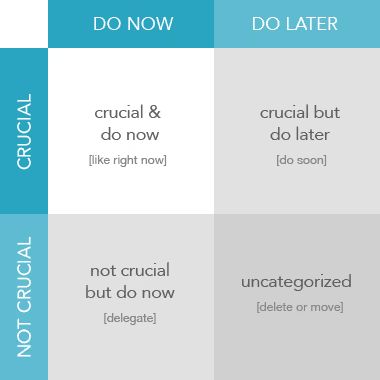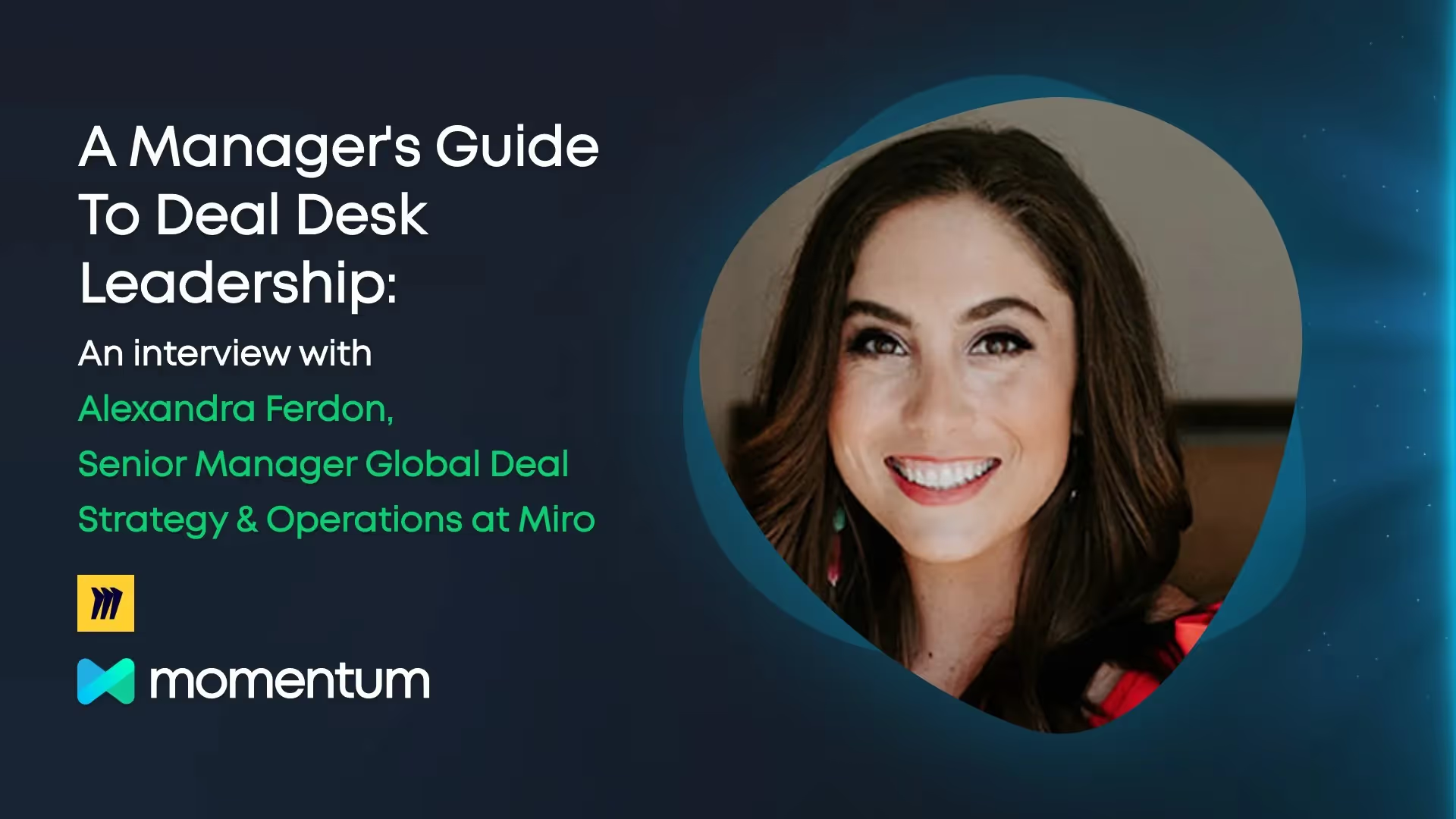If Alexandra Ferdon wasn’t working in sales, she’d be running a winery or food business. But the 10-year sales and deal desk veteran - who has worked at Dropbox, Target, and Tumblr - wishes she had taken a more conventional path into operations.
Where most people studied sales and marketing, Alex, who is now Senior Manager Global Deal Strategy & Operations at Miro, studied communication and English at Santa Clara University - a skill that’s not as out of place as one might think, considering the complex negotiations that deal desks undertake.
“I’d probably have gotten a more technical or business degree early on as I always feel like that is a gap for me.” - AF
A sales career offers plenty of opportunities to swing between independent contributor roles, where you can hone your technical skills, to leadership roles that require more teaching and coaching as opposed to being the expert in the room. An aptitude for communications pays off down the line.
In Alex’s case, moving from an independent contributor role at EA to representing 350+ people at Target required a momentous change in her mindset, leadership approach, and the ability to leverage her transferable skills.
“I think no matter the role, you can find transferable skills and always learn, which has really gotten me to where I am today. Moving back into management was a great way to challenge not just doing and being an expert, but teaching and coaching my team.” - AF
Fortunately for Alex, her career trajectory has taken her across different operational functions from HR and store management to SalesOps and deal desk roles. Her roles have all emphasized building relationships in one form or another - demanding the fusion of people and data to build effective organizations.
“I think looking at problems through both people relationships and data is a key theme.” - AF
Remote working in global sales
Working from an office - Alex’s preferred arrangement - exposes one to people from varying backgrounds, nationalities, and experiences within a set location. But switching to remote working allows cross-continental sales teams to coordinate with clients, colleagues, suppliers, and stakeholders across the world, bringing a greater diversity of thought and problem-solving.
When Alex moved from Tumblr’s San Francisco office to Dropbox’s Ireland office, her biggest adjustment was balancing family time against a global remit that saw her working across three time zones: the US, Asia Pacific & Japan, and EMEA. She also had to get used to the cultural nuances of colleagues in different countries to ensure communications landed in the right way.
“Someone in the Netherlands is going to be much more direct with you than say, someone from California. I think it challenges you both as an independent contributor and manager to be aware of the message you are trying to get across.” - AF
How to be a great deal desk manager
The bigger your sales team, the harder it can be to give personalized attention and coaching to each team member. Alex advises sales and deal desk managers to assess each team member’s motivations and growth plans and work to develop each person individually. Of course, as the Senior Deal Desk Manager at Miro, her role goes beyond just team development - especially as she’s building the team and function from scratch.
“My biggest priorities right now are shaping deal strategy for our most complex and biggest enterprise deals. We’re looking at trends in the market and working on system improvements to make it so our high and medium-velocity deals are not hindered by our processes or systems.” - AF
Beyond coaching reps, being a great sales leader involves walking the tightrope between using data to inform decisions and allowing for nuance when dealing with customers.
“I find it’s easy to go one of two ways: being too data-driven where they can’t see beyond what the forecast or number tell them, and being all about context with little data. Finding the happy medium seems to be a key success factor.” - AF
Reducing complexity in deal desk processes
The deal desk acts as a single source of truth for all complex contracts, pricing, quotes, proposals, deal structures, and coordinating approvals. This invites a fair amount of complexity that can worsen over time as the company scales. It’s thus important to spot common themes stemming from that complexity (such as pricing delays) and build processes to neutralize or improve those roadblocks.
One such friction point involves tracking and syncing information across different platforms like Slack and Salesforce. Tools like Momentum ease this friction by availing critical sales or product data in Salesforce to sales teams in Slack via Deal Rooms. This results in faster deals, more accurate information, and better pricing.
How to measure deal desk performance
As the connective tissue of any enterprise sales organization, bringing the deal desk aboard relevant sales deals ensures faster close times, more profitable contracts, and deeper relationships with customers. Alex uses three key metrics to judge the performance of a deal desk:
- The number of deals with deal desk support on them. This number should ideally reduce over time thanks to system improvements and better sales enablement assets.
- Increasing sales velocity, as deals get closed more quickly and profitably.
- ARR expansion rates by account, a metric that shows growth on both new and existing deals.
The Miro sales toolkit
Miro’s sales team uses Salesforce and Salesforce CPQ for customer relationship management.
They also use SpringCM (through Docusign) for their CLM, Clari for forecasting, Gong for sales intelligence, and Crayon for competitive intelligence.
Their stack further includes Guru for sales enablement and collateral, and their communication stack includes Zoom, Gmail, Slack, and Miro for collaboration.
Hiring and culture at Miro
Miro’s culture emphasizes three oft-repeated elements: teamwork, empathy, and a self-starter mentality. Obsessing over customer satisfaction is a proven way to get to unicorn status - just ask Apple, Spotify, and dozens of other consumer software favorites.
From a hiring perspective, Alex prioritizes the savvy balance of IQ and EQ, seeking candidates who can flexibly operate in grey areas where existing protocols might not suffice.
“What we are doing is bigger than each of us, as there is tremendous faith in the company, product, and culture. I think we are doing a good job of cultivating that today.” - AF
Don’t slack off - turn Slack off
Numerous articles have bemoaned the scourge of notifications that puncture our focus during critical moments - and Alex isn’t immune to their charms. Her productivity advice boils down to three things: turn off Slack notifications, create to-do lists, and use a prioritization matrix to figure out what’s urgent and what’s important in the long run.

Productivity comes in different forms, and consuming non-work content can help you be a better leader, contributor, and human being. Alex is currently reading Man’s Search For Meaning by Victor Frankel and binging on episodes of Smartless for Funs and The Knowledge Project. You can connect with Alex on LinkedIn.
Looking to optimize your deal desk? Check out how to scale a deal desk team on the Momentum blog.




.svg)

